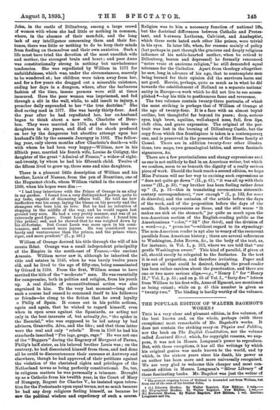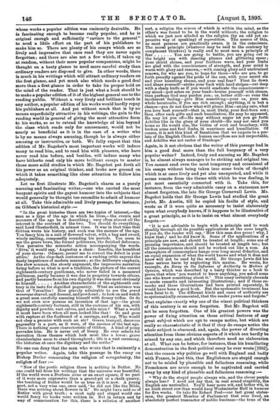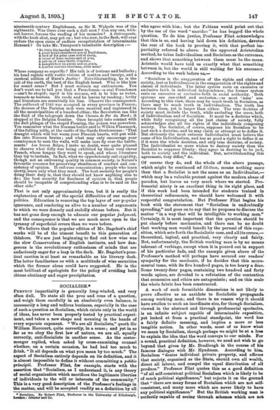THE POPULAR EDITION OF WALTER BAGEHOT'S WORKS.1-
THIS is a very clear and pleasant edition, in five volumes, of the best known and, on the whole, perhaps (with three exceptions) most remarkable of Mr. Bagehot's works. It does not contain the striking essay on Physics and Politics, nor the book on The English Constitution, nor the volume called Lombard Street, which, for copyright reasons, we sup- pose, it was not in Messrs. Longman's power to reproduce. But, with these exceptions, it has all the writings by which his original genius was made known to the world, and by which, in the sixteen years since his death, his power as an author has been more and more universally recognised. We are very glad to welcome this cheaper and most con- venient edition in Messrs. Longman's "Silver Library" of these fascinating books. Mr. Bagehot was just the writer of • The present reigning boom of Holland is descended not from William, but from one of the sons of his brother John.
t (1.) Literary Studies. By Walter Bagehot. New Edition. 8 vols.— (1) Bmgraphieci Studies. By Walter Bagehot. New Edition. 1 vol.- (3.) Economia Studies. By Walter Bagebot. New Edition. 1 vol. London:. Longmans and Co. whose works a popular edition was eminently desirable. He is fascinating enough to become really popular, and he is original enough and sufficiently "caviare to the general" to need a little effort on the part of his publishers to make him so. There are plenty of his essays which are so lively and impressive that once read they are never again forgotten; and there are also not a few which, if taken up at random, without their more popular companions, might be thought on a hasty glance to need more careful study than ordinary readers are disposed to give. In other words, there is much in his writings which will attract ordinary readers on the first glance, and yet much also which needs a good deal more than a first glance in order to take its proper hold on the mind of the reader. That is just what a book should be to make a popular edition of it of the highest general use to the reading public. Without a very lively and brilliant touch in any author, a popular edition of his works would hardly repay his publishers at all. And yet without much that is by no means superficially attractive in his writings, the gain to the reading world in general of giving the most attractive form to his works, so as to extend the knowledge of him beyond the class which reads only for amusement, would not be nearly so beneficial as it is in the case of a writer who is by no means always amusing, though he is always either amusing or instructive, or both. We fully expect that this edition of Mr. Bagehot's most important works will induce many to read him, and to read him with pleasure, who have never read him before, and besides, will induce many who have hitherto read only his more brilliant essays to master those more solid studies in which Mr. Bagehot put forth all his power as an original thinker, and broke new ground on which it takes something like close attention to follow him adequately.
Let us first illustrate Mr. Bagehot's charm as a purely amusing and fascinating writer,—one who carried the most buoyant spirits and the gayest humour into the subjects that would generally be thought too recondite to admit of humour at all. Take this admirable and lively passage, for instance, on Gibbon's historical style :—
" In the great histories there are two topics of interest,—the man as a type of the age in which he lives,—the events and manners of the age he is describing ; very often almost all the interest is the contrast of the two. You should do everything, said Lord Chesterfield, in minuet time. It was in that time that Gibbon wrote his history, and such was the manner of the age. You fancy him in a suit of flowered velvet, with a bag and sword, wisely smiling, composedly rounding his periods. You seem to see the grave bows, the formal politeness, the finished deference. You perceive the minuetic action accompanying the words. ` Give,' it would say, 'Augustus a chair : Zenobia, the humblest of your slaves : Odoacer, permit me to correct the defect in your attire.' As the slap-dash sentences of a rushing critic express the hasty impatience of modern manners ; so the deliberate emphasis, the slow acumen, the steady argument, the impressive narration bring before us what is now a tradition, the picture of the correct eighteenth-century gentleman, who never failed in a measured politeness, partly because it was due in propriety towards others, and partly because from his own dignity it was due most obviously to himself Another characteristic of the eighteenth cen- tury is its taste for dignified pageantry. What an existence was that of Versailles ! How gravely admirable to see the grand monarque shaved, and dressed, and powdered ; to look on and watch a great man carefully amusing himself with dreary trifles. Or do we not even now possess an invention of that age —the great eighteenth-century footman, still in the costume of his era, with dignity and powder, vast calves, and noble mien ? What a world it must have been when all men looked like that ! Go and gaze
with rapture at the footboard of a carriage, and say, Who would not obey a premier with such an air? Grave, tranquil, decorous pageantry is a part, as it were, of the essence of' the last age. There is nothing more characteristic of Gibbon. A kind of pomp pervades him. He is never out of livery. He ever selects for narration those themes which look most like a levee : grave chamberlains seem to stand throughout ; life is a vast ceremony, the historian at once the dignitary and the scribe."
No one can deny that the man who wrote that is eminently a popular writer. Again, take this passage in the essay on Bishop Butler concerning the religion of scrupulosity, the religion of fear :— "Now of the poetic religion there is nothing in Butler. No one could tell from his writings that the universe was beautiful. If the world were a Durham mine or an exact square, if no part of it were more expressive than a gravel-pit or a chalk quarry, the teaching of Butler would be as true as it is now. A young poet, not a very wise one, once said, ' he did not like the Bible, there was nothing about flowers in it.' He might have said so of Butler with great truth ; a most ugly and stupid world one would fancy his books were written in. But in return and by way of compensation for this, there is a religion of another
sort, a religion the source of which is within the mind, as the other's was found to be in the world without ; the religion to which we just now alluded as the religion (by an odd yet ex- pressive way of speaking) of superstition. The source of this, as most persons are practically aware, is in the conscience. The moral principle (whatever may be said to the contrary by complacent thinkers) is really and to most men a principle of
fear You are going to battle, you are going out in the bright sun with dancing plumes and glittering spear ; your shield shines, and your feathers wave, and your limbs are glad with the consciousness of strength, and your mind is warm with glory and renown,— with coming glory and unobtained renown, for who are you, to hope for these—who are you, to go forth proudly against the pride of the sun, with your secret sin and your haunting shame, and your real fear ? First lie down and abase yourself—strike your back with hard stripes—cut deep with a sharp knife as if you would eradicate the consciousness-- cry aloud—put ashes on your bead—bruise yourself with stones, then perhaps God may pardon you ; or, better still—so runs the incoherent feeling— give Him something—your ox, your ass, whole hecatombs, if you are rich enough ; anything, it is but a chance—you do not know What will please Him—at any rate, what you love best yourself—that is, most likely, your first-born son ; then, after such gifts and such humiliation, He may be appeased, He may let you off—He may without anger let you go forth Achilles like in the glory of your shield—Me may not send you home as He would else, the victim of rout and treachery, with broken arms and foul limbs, hi weariness and humiliation. Of course, it is not this kind of fanaticism that we impute to a pre- late of the English Church : human sacrifices are not respectable, and Achilles was not rector of Stanhope."
Again, is it not obvious that the writer of this passage had in him a good deal more than the full buoyancy of a very popular writer? Indeed, lively and amusing as Mr. Bagehot is, he almost always manages to be striking and original too. You cannot read even the most temporary and occasional of his essays without being taken into some train of thought which is at once lively and yet also unexpected, and while it seems remote from the theme with which he was dealing, is yet most essentially connected with it. Take this, for instance, from the very admirable essay on a statesman now almost forgotten, the late Sir George Cornewall Lewis. Mr. Bagehot holds that Sir George Lewis had studied the great jurist, Mr. Austin, till he copied his faults of style, and wrote as if it were quite as necessary to insist elaborately upon what everybody knows, if it happens to be illustrative of a great principle, as it is to insist on what almost everybody
forgets :—
"It is not advisable to begin with a principle and to work steadily through all its possible applications at the same length. If you do, the reader will say, How this man does prose ! why, I knew that ;' and he did know it. Some of the applications of a principle are new, and should be treated at length ; some are of pressing importance, and should be treated at length too ; but all the consequences should not be worked out like a sum. An atmosphere of commonplace hangs over long moral didactics, and an equal expansion of what the world knows and what it does not know will not be read by the world. Sir George Lewis did his fame serious harm by neglecting this maxim. He wrote, for example, An Essay on the Influence of Authority in Matters of Opinion, which was described by a hasty thinker as a book to prove that when ' you wanted to know anything, you asked some one who knew something about it.' This essay certainly abounds in acute remarks and interesting illustrations ; and if these re- marks and these illustrations had been printed separately, it would have been a good book. But the systematic treatment has been fatal to it. The different kinds and cases of authority are so systematically enumerated, that the reader yawns and forgets."
That explains exactly why one of the wisest political thinkers of this century is so soon forgotten. But Mr. Bagehot will not be soon forgotten. One of his greatest powers was the power of fixing attention on those critical features of any great subject which are apt to escape notice, but which are really so charasteristic of it that if they do escape notice the whole subject is obscured, and, again, the power of diverting attention from those obvious aspects of it which can hardly be missed by any one, and which therefore need no elaboration at all. What can be better, for instance, than his humiliating demonstration in the first political essay he ever wrote [1852],
that the reason why politics go well with England and badly with France, is just this, that Englishmen are stupid eneugh not to be misled by plausible and fallacious reasoning, while Frenchmen are acute enough to be captivated and carried away by any kind of plausible and fallacious reasoning :—
" Why do the stupid people always win, and the clever people always lose ? I need not say that, in real sound stupidity, the English are unrivalled. You'll hear more wit, and better wit, in an Irish street row than would keep Westminster Hall in humour for five weeks. Or take Sir Robert Peel—our last great states- man, the greatest Member of Parliament that ever lived, an absolutely perfect transactor of public business—the type of the nineteenth-century Englishman, as Sir R. Walpole was of the eighteenth. Was there ever such a dull man ? Can any one, with- out horror, foresee the reading of his memoirs ? A dairvoyante, with the book shut, may get on ; but who now, in the flesh, will ever endure the open vision of endless recapitulation of interminable Hansard ? Or take Mr. Tennyson's inimitable description :- 'No little lily-handed Baronet he,
A great broad-shouldered genal Englishman, A lord of fat prize oxen and of sheep, A raiser of huge melons and of p:ne, A patron of some thirty charitie. A pamphleteer on guano and on grain, A quarter sessions chairman, abler none.'
Whose company so soporific ? His talk is of truisms and bullocks ; his head replete with rustic visions of mutton and turnips, and a cerebral edition of Burn's Justice ! Notwithstanding, he is the salt of the earth, the best of the English breed. Who is like him for sound sense ? But I must restrain my enthusiasm. You don't want me to tell you that a Frenchman—a real Frenchman —can't be stupid ; esprit is his essence, wit is to him as water, bonsmots as bonbons. He reads and he learns by reading ; levity and literature are essentially his line. Observe the consequence. The outbreak of 1843 was accepted in every province in France; the decrees of the Parisian mob were received and registered in all the municipalities of a hundred cities ; the Revolution ran like the fluid of the telegraph down the Chemin de Fer du Nord ; it stopped at the Belgian frontier. Once brought into contact with the dull phlegm of the stupid Fleming, the poison was powerless. You remember what the Norman butler said to Wilkin Flammock, of the fulling mills, at the castle of the Garde Douloureuse : That draught which will but warm your Flemish hearts, will put wild- fire into Norman brains ; and what may only encourage your countrymen to man the walls, will make ours fly over the battle- ments.' Les braves Belges, I make no doubt, were quite pleased to observe what folly was being exhibited by those very clever French, whose tongue they want to speak, and whose literature they try to imitate. In fact, what we opprobriously call stupidity, though not an enlivening quality in common society, is Nature's favourite resource for preserving steadiness of conduct and con- sistency of opinion. It enforces concentration ; people who learn slowly, learn only what they must. The best security for people's doing their duty is, that they should not know anything else to do ; the best security for fixedness of opinion is, that people should be incapable of comprehending what is to be said on the other side."
That is not only approximately true, but it is really the explanation of most of the special difficulties of our modern politics. Education is removing the top layer of our popular
ignorance, and rendering us alive to a number of arguments to which we were densely and stolidly obtuse before. But it has not gone deep enough to educate our popular judgment, and the consequence is that we are much more open to the tyranny of superficial errors than we were before.
We believe that the popular edition of Mr. Bagehot's chief works will be of the utmost benefit to this generation of thinkers. We are just beginning to find out how wise was the slow Conservatism of English instincts, and how dan- gerous is the revolutionary enthusiasm of minds that are audaciously eager for a leap in the dark. Mr. Bagehot's prac- tical caution is at least as remarkable as his literary dash. The latter familiarises us with a multitude of wise securities which the former alone could have suggested. He is the most brilliant of apologists for the policy of avoiding both obtuse obstinacy and eager precipitation.




































 Previous page
Previous page